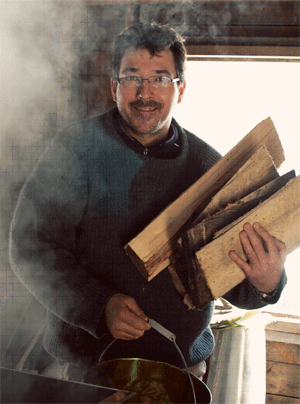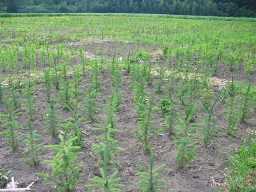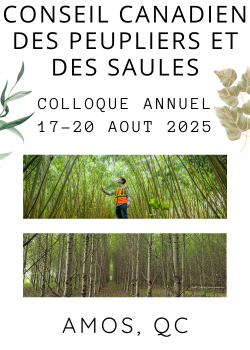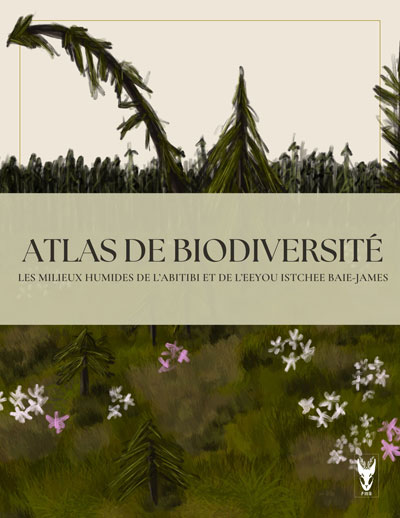
Christian Messier
Regular member
Applied Forest Ecology
Professor
Université du Québec en Outaouais - Department of Natural Sciences
Université du Québec à Montréal - Department of Science of Biology
Scientific Director of the Institute of Temperate Forest Sciences (ISFORT)
58, Rue Principale
Ripon, Qc, Canada, JOV 1V0
Canada Chair on tree resilience to global changes
Université du Québec en Outaouais
Département des Sciences naturelles
NSERC/Hydro-Quebec Chair on tree growth control
Université du Québec à Montréal
Département des sciences biologiques
141 Président-Kennedy
Montréal, Qc, Canada, H2X 3Y5
Tel: (819)595-3900 Ext. 2903
UQAM Department Page ![]() | ISFORT
| ISFORT ![]() | NSERC/Hydro-Quebec research chair on tree growth
| NSERC/Hydro-Quebec research chair on tree growth ![]() | ResearchGate
| ResearchGate ![]() | Google Scholar
| Google Scholar ![]() | aucoeurdelarbre.ca
| aucoeurdelarbre.ca ![]()
Two new books: Nature all around us ![]() and Managing Forests as Complex Adaptive Systems
and Managing Forests as Complex Adaptive Systems ![]() !
!
Recruitment For information ![]() !
!
Master in Sustainable Management of Forest Ecosystem For information ![]() !
!
ACADEMIC BACKGROUND | BIOGRAPHY | RESEARCH THEMES
CURRENT MAJOR PROJECTS | CURRENT PROJECTS
RECENTS AWARDS | PUBLICATIONS
ACADEMIC BACKGROUND
- Postdoctoral fellowship in forest ecology, 1992 (University of Helsinki)
- Ph.D. in forest sciences, 1991 (University of British Columbia)
- M.Sc. in forest sciences, 1986 (Université Laval)
- B.Sc. in forest engineering, 1984 (Université Laval)
BIOGRAPHY
Christian Messier defended his thesis on the dynamics of forest regeneration following the cutting of old growth forests on the west coast of Canada. After spending a year at the University of Helsinki in Finland as a postdoctoral researcher in forest ecology, he began his tenure as a professor at UQAM in 1992 in the Department of Biological Sciences. He was a member (and co-leader from 1996 to 1999) of the Sustainable Forest Management Network (RGDF) from 1995 to 2010. He was also a member of the board of directors of Ligniculture-Québec network, of which he is the co-founder, a large-scale project aimed at maximizing wood production on small areas. Dr. Messier participated in the creation of the CEF and was its director from 2006 to 2010. In 2013, he became professor at UQO in the Department of Natural Sciences and also became director of the Institute of Temperate forest Sciences (ISFORT). Holder of the NSERC / Hydro-Quebec Chair on tree growth control, his mission is to obtain rigorous scientific information on the biophysical factors affecting the growth and development of trees in urban and peri-urban areas in order to be able to optimize the methods of intervention on these and allow a more harmonious cohabitation between trees and Hydro-Québec infrastructures. He also holds the Canada Research Chair (level 1) on forest resilience in the face of global changes, which aims to improve our ability to manage forests to effectively increase their resilience. His research interests are broad, ranging from fundamental understanding of tree growth and mortality, to the development of decision tools for better management of natural and urban forest harvesting. His research led him to study several biomes around the world. He has published over 280 articles in scientific journals and recently co-edited a book entitled "Managing forests as complex adaptive systems" and another for the general public on "Ecology in the city".
RECENT AWARDS
- July 2020 - Francqui Foundation Chair (Belgium)
- September 2019 - Member of The royal society of Canada (member of the science academia)
- February 2017 - Christian Messier, named personality of the year "Radio-Canada/Le Droit" in Health, Sciences and Technologies
 .
.
- November 2016 - "Humboldt Research Award" of the prestigious Alexander von Humboldt Foundation
 .
.
- October 8th 2010 - Prix Acfas – Michel-Jurdant 2010 (Sciences de l'environnement)
 ;
;
- October 3rd, 2006 – Canadian Forestry Scientific Achievement Award from the Canadian Institute of Forestry;
- October 26th, 2006 – Honorary Member of the Association of Quebec Biologists;
- December 5, 2006 – Winner of the inaugural Networks of Centres of Excellence Chairs’ Award.
RESEARCH DESCRIPTION
Dr. Messier's research is divided into two main axes. The first axis aims at the study of complex functioning of managed natural forest systems in order to develop management approaches that promote their resilience in the face of global changes. His research touches both the stand scale and that of the forest landscape and draws on the science of complex networks and functional diversity. Data is collected in the field and simulation models are created to test hypotheses and propose solutions to current problems affecting forest ecosystems.
The second axis aims at the study of trees and urban forests in order to reconcile the needs of minimizing the negative impacts of trees on the human construct and to maximize the many services they provide to people. His studies aim to develop new approaches and tools to improve (1) the pruning interventions that are done regularly on trees and (2) tree planting strategies in urban and peri-urban areas.
CURRENT MAJOR PROJECTS
Canada Research Chair on forest resilience to global changes
This Canada Research Chair in forest resilience to global changes aims at improving our ability to manage forests to efficiently increase its resilience. It will establish and use novel high-density multi-species tree experiments to study mechanisms of interaction among tree species and the underlying role of these mechanisms in the functioning and resilience of forest ecosystems to environmental stressors. It will then integrate this better understanding of the role and importance of tree diversity in coping with environmental stressors with spatially-explicit stand dynamic and landscape models and network theory and functional diversity approaches to develop efficient sylvicultural approaches to promote forest resilience to fragmented forests of Canada and worldwide.
NSERC/Hydro-Québec Chair on tree growth control
Trees are very present in Québec and Canada, both in the natural environment and in our towns and countryside where they embellish our lives, filter the air, reduce temperature variations, produce wood, fix carbon and provide habitat for many living organisms. These environmental and economic services provided by trees are exceedingly important for municipalities (e.g. cities of Montreal and Quebec) and other private and public organisations (e.g. the Integrated Quebec Intensive Silviculture Network, the International Society of Quebec Arboriculture and Ouranos) who promote tree use. Trees, however, are often in conflict with the human-built environment often breaking electrical distribution equipment. Trees, particularly those with expansive crowns, represent a significant risk in both the breaking of electrical distribution equipment and the safety of the public and of contractors who do maintenance. For the main Chair partner, Hydro-Quebec, the monetary losses incurred represent hundreds of millions of dollars per year.

To optimize intervention methods and to allow a more harmonious coexistence between trees and Hydro-Québec’s infrastructure, the Chair’s projects are grouped into 3 major complementary research themes.
- Theme 1: Understanding the dynamics of tree and tree crown growth in relation to physiology, morphology, architecture and environment: Bastien Lecigne (Ph.D.); Alain Paquette (professeur) ; Guillaume Perrette (Ph.D.)
- Theme 2: Studying the dynamics of tree biomechanical stability according to structural and biophysical conditions: Susy Domenicano (Ph.D.)
- Theme 3: Developing models and algorithms to enable monitoring and prediction of tree growth based on the biophysical conditions found throughout Quebec
Together, these studies will help with the integration of knowledge of ecophysiology of growth, biomechanics of tree stability, 3D models of individual tree growth and of dynamic and spatial modelling of communities and groups of trees in eastern Canada. The aims are (i) to test a series of scientific theoretical and applied hypotheses on the growth and development of trees and the factors contributing to their coexistence in complex stands, (ii) to optimize the interventions needed to control the woody vegetation along Hydro-Québec’s electrical distribution system, and (iii) to better plan tree crown development in inhabited areas. This project will develop, for both urban and rural areas, crown development strategies and methods of tree growth control which are better adapted, less intrusive, less costly and more efficient, therefore making them more socially acceptable.
The Chair’s research is carried out in collaboration with professors Sylvain Delagrange (UQO), Tanya Handa (UQAM), Alain Paquette (UQAM), Eero Nikinmaa (University of Helsinki) and Juan Posada (Rosario Universidad).
The right tree at the right place - Urban Forest Immunization Kit for Global Change: SylvCIT
The project involves developing a web-based application that will enable urban forest managers to select the best tree species to plant in different parts of the city to maximize the economic and social benefits and resilience of tree cover to global change. Basically, we will develop a Beta version of a web application that will gather information on climatic, entomological and pathological risks, the geographical distribution of trees at each street level, the value of the services that each tree species produces and the diversity of ecological characteristics of trees that can be planted. This will quickly and easily generate a list of the best species of trees to plant for a specific location in each street, park and neighborhood, based on the trees already there to IMMUNIZE the tree cover against future disasters.

This application would be distributed free of charge, but what we want to create will offer follow-up services and continual updates based on the latest scientific knowledge. The economic and social benefits for a city like Montreal are enormous: better health for the people, maintaining the value of homes and the services provided by trees, lower maintenance costs, creating a new business and the enhancement of Montreal's expertise in the field of urban forestry.
This project is carried out in collaboration with the professors of the department of biological sciencesDaniel Kneeshaw (UQAM), Tanya Handa (UQAM), Alain Paquette (UQAM), Marie-Jean Meurs from IT department (UQAM) and Thi Thanh Hein Pham from the Urban and Tourism Studies Department (UQAM).
You can find more information by reading this article: https://unpointcinq.ca/techno/bon-arbre-au-bon-endroit/
Sutton permanent plot
In the face of climate change, the fate of forest ecosystems is of particularly concern for Quebec because of their economical and ecological importance. The discipline of ecology, however, suffers currently from a lack of theoretical knowledge to predict ecosystem response to climate change. To compensate for this lack of knowledge, the next generation of climate change studies have to imperatively combine observations on large-scale climatic gradients with smaller-scale experiments (Dunne et al., 2004).
The permanent plot situated in the Green Mountains Ecological Reserve, near Sutton in the Eastern Townships, is located on an elevation gradient of 200 meters, which allows a transition from a sugar maple-yellow birch forest to a balsam fir-white birch forest. The migration of the sugar maple towards the balsam fir dominated forest is studied and consequently, it is essential to have detailed knowledge of the spatial dynamics of this species. A grid of 20 m by 20 m has being established to mark the 20 ha plot where all trees with a minimum 5-cm diameter at breast height had been mapped. The plots include 25 environmental monitoring stations equipped with lysimeters, temperature sensors (at 1m from the ground and in the soil), soil moisture sensors, seed traps, insect’s pitfalls and 1 m² plots to count seedlings.

General objective
- To better understand the factors determining migration of species and ecosystem functioning at the edge of their distribution range. In studying a forest ecosystem, fundamental knowledge will be acquired and will serve to improve our ecosystem management practices.
Specific objectives
- To identify the factors that limit the migration of sugar maple and associated species in the boreal forest under the pressure of climate change by studying the factors that limit population growth of sugar maple at the edge of its distribution range and by taking into account the interaction of competition, predation and major biogeochemical cycles.
- To produce data for a forest dynamics simulation model to estimate the rate of migration of sugar maple into fir stands and identifying critical elements that affect maple migration. The results will be critical in the development of a high-tech tool created to assist managers involved in forest management in Québec.
The research project is structured into four components that share a common methodology:
- Part 1 - Patterns of biodiversity distribution
- Analysis of the co-distribution of detrivores Eric Harvey (M.Sc.)
- Dynamics of understory vegetation
- Part 2 - Population growth of sugar maple
- Dynamics of seedling recruitment
- Seedling growth
- Modeling of growth based on the local environment, soil and climate
- Part 3 - Nutrient cycles
- Part 4 - Modeling of migration rates using an individual tree-level model
The results of this research program will contribute to the modification of our forest ecosystem management practices. Forest resources in temperate and boreal biomes are of paramount economical and ecological importance. With this research project which combines empirical observations, experiments and modeling, we will have a better understanding of key elements that limit the ecosystem’s resilience to climate change. This information will be crucial for forest managers and managers of natural reserves and protected areas.
International Diversity Experiment Network with Trees (IDENT)

In 2009, the first plantation of the International Diversity Experiment Network with trees (IDENT) was established in the Montreal area. Subsequently, other plantations were established at Auclair (Qc), Saul-Ste-Marie (Ont), Minnesota (USA) and Europe (Germany and Italy). These experimental plantations were designed to test various hypotheses about the role of biodiversity in ecosystem functioning. To this end, the choice of species planted in each plot varies in relation to species diversity, origin of species (North American and European) and their functional traits. The experiment wants to answer the following questions: (1) How do the different components of diversity, i.e., species richness and functional diversity, contribute to ecosystem functioning? (2) Which species and traits to choose for creating the desired functional diversity gradient? (3) Is complementarity the driving mechanism of overyielding in young tree communities? (4) How does neighbourhood diversity drive the realized FD and trait values? (5) At which spatial and temporal scales do complementarity effects occur? (6) How can we test for trophic-mediated complementarity? (7) How do environmental conditions influence species interactions?
IDENT also invested in 2015, in an educational platform for the general public on the importance of biodiversity trees by creating IDENT-Cité, based in Montreal. IDENT-Cité is a museum type of installation where trees of increasing levels of diversity were planted to form a vegetal maze in the form of a double spiral. Visitors will thus are able to experiment directly what diversity is, and how trees and diversity affect the environment. Many activities are proposed, with animation or simple information panels. The site also serves as an arboretum, representing tree species and cultivars available to citizens, as well as promoting new species to increase diversity.
For more information, please make sure to check out IDENT's main website: http://www.treedivnet.ugent.be/ExpIDENT.html
FORMER PROJECTS
The TRIAD project is a pilot project that aims to provide a socially acceptable, economically viable and sustainable solution to forest management. Inaugurated in 2003, this project is part of the 2008-2013 development plan for the 890 000 ha Forest Management Unit 042-51 (FMU) in Mauricie. The current plan proposes that 11% of the territory be reserved for comprehensive conservation (mostly old-growth forest), 20% be reserved for forest production (intensive management including fast-growing plantations on 0,6% of the territory) and the remaining 69% be used for ecosystem management (Tittler et Messier, 2009) ![]() .
.
For several years many students and researchers have been involved in this project and the first results are beginning to be published. You will find on the CFR TRIAD website (under construction) more details and results on the major projects. The official website of the TRIAD project can be found here: http://www.projettriade.ca/
The SORTIE model is a forest dynamics simulation model that is spatially explicit and process-based (Canham et Murphy 2009). SORTIE was initially developed to simulate forest succession in deciduous forests from north-eastern America (Pacala et al. 1993). This model is particularly appropriate for modeling forest dynamics in forests with a heterogeneous canopy (ex.: gaps). During the last few years, it has been adapted to others forest types and has been used to model the effect of partial cuts (Coates et al. 2003; Thorpe et al. 2010).
Mixed boreal forest
There is currently a project in the mixed boreal forest that aims to compare natural disturbance regimes with the traditional silvicultural system at the stand level in order to develop a silvicultural system that can be integrated to a mixed-forest management framework. The project also aims to assess its social acceptability by stakeholders. The approach uses three temporal scales (past, present and future) and three complementary methodological approaches (retrospective studies, silvicultural trials and stand-level modeling) to compare two major classes of secondary disturbances, both natural (epidemics, spruce budworm, and windthrow) and industrial (partial cuts). This project will provide a framework by which forestry practices and innovative management approaches will be developed for this region. Brian Harvey
Deciduous forest
A similar project is underway in the deciduous forest. The general objective is to provide guidelines for ecosystem management of sugar maple stands by evaluating and comparing the impact of silvicultural treatments on species composition and production using a “case study” approach in a specific region (Estrie). This project will include both fieldwork and modeling components. Fieldwork will be used to collect the data necessary to complete the calibration and evaluation of SORTIE for sugar maple stands from the Estrie region. The fieldwork was planned to generate tangible knowledge to be used by managers (independent of the modeling component), particularly by obtaining a better understanding of the effect of silvicultural treatments on regeneration and growth of residual trees. Marilou Beaudet
CURRENT TEAM
- Kim Bannon, research assistant, coordinates the Messier lab and provides assistance in the various research projects of graduate students.
- Fanny Maure, research assistant, works on projects related to increasing the resilience of forests, both in urban and natural environments. The approach put forward is a functional approach and thus aims to diversify trees from the point of view of their biological characteristics. At the same time, she is also interested in what could represent future threats to the forests of tomorrow.
- Clément Hardy explores the long-term effects of Quebec's uneven forest management strategies using stochastic and spatially explicit models.
- Daniel Schönig assesses the socio-ecological sustainability of forest communities.
- Florentin Jaeger studies soil dynamics of mixed forests.
- Johanna Andrea Martinez Villa studies the effects of environmental and anthropogenic filters on functional composition in tree communities at tropical and temperate forest.
- Catherine Turner is exploring the role of nature-based solutions as a tool for resilient global change adaptation.
- Élise Bouchard studies the ecophysiology of the maple water flow.
- Zoé Ribeyre studies stress memory (known as priming) in different species of temperate forest trees in the context of repeated drought.
PUBLICATIONS
All publications are available on this page. You can also download an EndNote file or BibTeX file and then view it with the software JabRef ![]() .
.
Former Personnel
- Martina Sánchez-Pinillos (Postdoc 2025)
- Tanvir Ahmed Shovon (Postdoc 2024)
- Olivier Villemaire-Côté (Postdoc 2023)
- Benoit Gendreau-Berthiaume (Prof. de rech. 2022)
- Gauthier Lapa (Postdoc 2022)
- Bastien Lecigne (Postdoc 2022)
- Annick St-Denis (Postdoc 2022)
- Michaël Belluau (Postdoc 2021)
- Marco Mina (Postdoc 2021)
- Rita Sousa Silva (Postdoc 2021)
- Nuria Aquilué Junyent (Postdoc 2020)
- Jorge Luis Narváez Tobón (Stage 2020)
- Ana Mariluz Portilla Benavides (Stage 2020)
- Justine Fontaine-Topaloff (Prof. de rech. 2019)
- Clotilde Pires (Stage 2019)
- Vianny Plaza Ortega (Stage 2019)
- Laura Ramirez Quintero (Stage 2019)
- Valentina Vitali (Postdoc 2019)
- Sonia Carmon (Stage 2018)
- Benoit Gendreau-Berthiaume (Postdoc 2018)
- Francis Giard (Stage 2018)
- Samuel Royer-Tardif (Postdoc 2018)
- Elena Hidalgo Gómez (Stage 2017)
- Bonnie Waring (Postdoc 2017)
- Virginie-Arielle Angers (Postdoc 2016)
- Virginie-Arielle Angers (Prof. de rech. 2016)
- Noémie Lemaire (Stage 2016)
- Alain Paquette (Prof. de rech. 2016)
- Aitor Ameztegui (Postdoc 2015)
- Rebecca Tittler (Postdoc 2015)
- Rebecca Tittler (Prof. de rech. 2015)
- Mahbubul Alam (Postdoc 2014)
- Maria Alejandra Chadid (Stage 2014)
- Suzie Dubuc (Stage 2014)
- Raphaëlle Fréchon (Stage 2014)
- Amélie Goulet (Stage 2014)
- Katy Lavoie (Stage 2014)
- Charles Nock (Postdoc 2014)
- Ernestine de Roland Razanajafy (Stage 2014)
- Olivier Taugourdeau (Postdoc 2014)
- Alice Angelini (Stage 2013)
- Virginie-Arielle Angers (Postdoc 2013)
- Sara Bastien-Henri (Prof. de rech. 2013)
- Dylan James Craven (Postdoc 2013)
- Élise Filotas (Postdoc 2013)
- François Girard (Postdoc 2013)
- David Rivest (Postdoc 2013)
- Chelsea Archambault (Tech. 2012)
- Xavier Bastien-Henri (Stage 2012)
- Lucie Chaboisson (Stage 2012)
- Dylan James Craven (Stage 2012)
- Carine Côté-Germain (Stage 2012)
- David Andres Herrera Ramirez (Stage 2012)
- Olivier Lafontaine (Stage 2012)
- Camille Lebel (Stage 2012)
- Santiago Martín Alcón (Stage 2012)
- Sergio Martínez Ruiz (Stage 2012)
- Kristina Milllett (Stage 2012)
- Tomona Morita (Stage 2012)
- Laura Nikinmaa (Stage 2012)
- Alain Paquette (Postdoc 2012)
- Émilie Rousselle (Stage 2012)
- Matthias Schwetterlé (Stage 2012)
- Sebastian Vilalenche (Stage 2012)
- Laura Williams (Stage 2012)
- Florian Xenard (Stage 2012)
- Thomas André (Stage 2011)
- Kim Bannon (Stage 2011)
- Sophie Carpentier (Stage 2011)
- Chantal Cloutier (Stage 2011)
- Yannick Deschambault (Stage 2011)
- Susy Domenicano (Prof. de rech. 2011)
- Kate English (Stage 2011)
- Peter Gaucher (Stage 2011)
- François Hébert (Postdoc 2011)
- Christophe Jenkins (Stage 2011)
- Jari Perttunen (Postdoc 2011)
- Nathan Probst (Stage 2011)
- Paloma Ruiz Beneto (Stage 2011)
- Aitor Ameztegui (Stage 2010)
- Marilou Beaudet (Prof. de rech. 2010)
- Frédéric Boivin (Prof. de rech. 2010)
- Mario Buitrago (Tech. 2010)
- Elhadji Malick Diallo (Tech. 2010)
- Matthew Follett (Tech. 2010)
- Ilona Lehtokoski (Stage 2010)
- Alain Paquette (Postdoc 2010)
- Gabrielle Parent (Stage 2010)
- Antoine Roux (Stage 2010)
- Éric Harvey (Tech. 2009)
- Bastien Lecigne (Stage 2009)
- Loïc Munier (Stage 2009)
- Anne-Geneviève Poirier (Tech. 2009)
- Philippe Roux (Stage 2009)
- Jean-Gabriel Soulières-Jasmin (Stage 2009)
- Maxime Tremblay (Tech. 2009)
- Ève Lauzon (Prof. de rech. 2008)
- Michael Papaik (Postdoc 2008)
- Alain Paquette (Postdoc 2008)
- Julie Poulin (Prof. de rech. 2008)
- Marilyne Robidoux (Stage 2008)
- Laurent Torres (Stage 2008)
- Juan Posada (Postdoc 2007)
- Héloïse Rheault (Postdoc 2007)
- Lluis Coll (Postdoc 2006)
Former Students
Director
- Florentin Clemens Jaeger (Ph.D. 2024)
- Johanna Andrea Martinez Villa (Ph.D. 2024)
- Zoé Ribeyre (Ph.D. 2024)
- Caroline Gagné (Ph.D. 2022)
- Pierre-Antoine Bouliane (M.Sc. 2021)
- Samuel Collin-Latour (M.Sc. 2021)
- Ananda Christophe (M.Sc. 2020)
- Xavier Francoeur (Ph.D. 2020)
- Guillaume Perrette (Ph.D. 2020)
- Nuria Aquilué Junyent (Ph.D. 2018)
- Marc-Olivier Martin-Guay (M.Sc. 2017)
- Jorge Ramirez (Ph.D. 2017)
- Kevin Solarik (Ph.D. 2017)
- Matthew Follett (M.Sc. 2016)
- Melanie McCavour (Ph.D. 2016)
- Annick St-Denis (Ph.D. 2016)
- Sophie Carpentier (M.Sc. 2015)
- Mario Buitrago (M.Sc. 2014)
- Cornelia Garbe (Ph.D. 2014)
- Cynthia Patry (Ph.D. 2014)
- Jean-Bastien Lambert (M.Sc. 2012)
- Isabelle Witté (Ph.D. 2012)
- Kim Bannon (M.Sc. 2011)
- Elhadji Malick Diallo (M.Sc. 2011)
- Frédéric Boivin (M.Sc. 2010)
- Marie-Ève Chaume (M.Sc. 2010)
- Ian Seiferling (M.Sc. 2010)
- Catherine Malo (M.Sc. 2009)
- Sara Bastien-Henri (M.Sc. 2008)
- Henrik Hartmann (Ph.D. 2008)
- Pascal Côté (M.Sc. 2007)
- Ronald Charles Drever (Ph.D. 2007)
- Julien Fortier (M.Sc. 2007)
- Dodick Gasser (Ph.D. 2007)
- Dominique Gravel (Ph.D. 2007)
- Amélie Poitras-Larivière (M.Sc. 2007)
- Lionel Humbert (M.Sc. 2006)
- Marie-Lou Lefrançois (M.Sc. 2006)
- Virginie-Arielle Angers (M.Sc. 2004)
Co-Director
- Clément Hardy (Ph.D. 2024)
- Jon Urgoiti Otazua (Ph.D. 2023)
- Félix Lorrain Landry (Ph.D. 2022)
- Maria Isabel Caricol Aristizabal (M.Sc. 2021)
- Rebeca Cordero Montoya (M.Sc. 2021)
- Bastien Lecigne (Ph.D. 2021)
- Michel Guarinoni (M.Sc. 2020)
- Alexandre Beaudoin (M.Sc. 2019)
- Simon Côté-Bourgoin (M.Sc. 2019)
- Jean-François Senécal (Ph.D. 2018)
- Alexandre Collin (Ph.D. 2017)
- Isabelle Laforest-Lapointe (Ph.D. 2017)
- Chelsea Archambault (M.Sc. 2015)
- Nathaly Guerrero (M.Sc. 2013)
- Sandrine Gautier-Ethier (M.Sc. 2012)
- Bastien Lecigne (M.Sc. 2012)
- Simon Bilodeau-Gauthier (Ph.D. 2011)
- Kati Berninger (Ph.D. 2009)
- Isabelle Aubin (Ph.D. 2008)
- Simon Bilodeau-Gauthier (M.Sc. 2007)
- Susy Domenicano (M.Sc. 2006)
<< Marc Mazerolle | MembresReguliers | Miguel Montoro Girona >>











